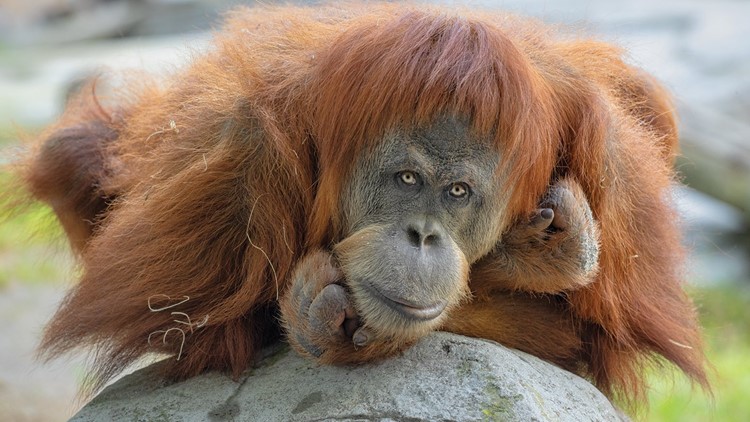SAN DIEGO — While Americans are making appointments online and over the phone for the chance to be inoculated against COVID-19, the first great apes have gotten their shots.
According to National Geographic, four orangutans and five bonobos at the San Diego Zoo received two doses each of Zoetis' experimental vaccine for animals.
“This isn’t the norm. In my career, I haven’t had access to an experimental vaccine this early in the process and haven’t had such an overwhelming desire to want to use one,” Nadine Lamberski, chief conservation and wildlife health officer at the San Diego Zoo Wildlife Alliance told the outlet.
The veterinary pharmaceutical company first developed the vaccine in 2020 over concerns about coronavirus in domestic animals. It confirmed its team did receive a request from the zoo in January for a supply of shots for the great ape population.
“We are proud to be able to assist the San Diego Zoo Global veterinary staff and the animals in their care with their recent COVID-19 concerns,” said Dr. Mahesh Kumar, Senior Vice President of Global Biologics at Zoetis.
Distracted by treats, nine of the zoo's great apes received the vaccine, becoming the first known non-human primates to be inoculated in the U.S.
The shots came around the same time the San Diego Zoo Safari Park's Gorilla troop was allowed to resume guest visitation. Access to the gorillas was limited after several troop members tested positive for SARS-CoV-2, the virus that causes COVID-19
According to the zoo, the gorillas were infected with the B.1.429 strain of the coronavirus. Some of the primates showed symptoms of coughing, congestion, nasal discharge and intermittent lethargy.
“We’re so grateful for the outpouring concern and support we’ve received while the troop safely recovered,” said Lisa Peterson, executive director of the San Diego Zoo Safari Park. “We’re thrilled to share the joy that this beloved troop brings to our community and to our guests.”
Since receiving the vaccine, Lamberski told Nat Geo that the apes have not shown adverse reactions and are doing well. They are waiting on results to see if blood drawn from two of the primates shows the development of antibodies.
The experimental vaccine was initially studied in dogs and cats, but Lamberski decided that it was worth the risk to test the great apes.
“It’s not like we randomly grab a vaccine and give it to a novel species. A lot of thought and research goes into it—what’s the risk of doing it and what’s the risk of not doing it. Our motto is, above all, to do no harm," she said.
It's an idea that Zoetic backs-up. In a press release, it said the vaccine demonstrated to be safe and have a "reasonable expectation of efficacy." CBS News reports the vaccine is made for a specific pathogen instead of a specific species.
When the coronavirus pandemic first began experts warned about the serious effect it could have on our closest living relatives, the great ape population. An already endangered species was at risk of being introduced to a virus that, at the time, had an unknown morbidity and mortality rate.
While the test is available, Zoetic says the USDA and global veterinary organizations are not yet recommending its use in the board testing of animals.
- CVS offering COVID vaccine to Florida teachers under 50
- $600K in COVID-19 precautions: Here's what to expect at this year's Florida Strawberry Festival
- House passes sweeping police reform bill named after George Floyd
- Senate debate on COVID bill, $1,400 checks may start today
- SpaceX's Starship sticks its landing but blows up
- Where to get the COVID-19 vaccine in Florida
►Breaking news and weather alerts: Get the free 10 Tampa Bay app
►Stay In the Know! Sign up now for the Brightside Blend Newsletter



